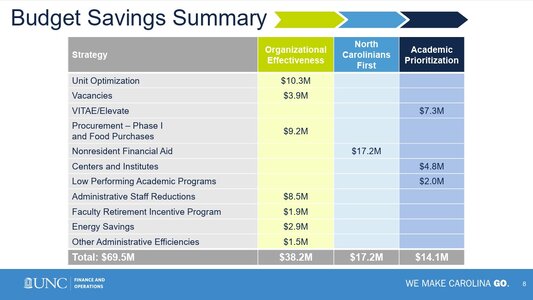UNC Leaders Propose An Estimated $70 Million in Budget Cuts Amid Federal Financial Crunch
Posted by
Brighton McConnell | Jul 30, 2025 |
Higher Education,
UNC
Facing funding cuts from both the state and federal governments, UNC administrators shared some broad areas it aims to trim roughly $70 million from its operating budget on Wednesday — including consolidating jobs and scaling back financial aid to out-of-state students.
Ahead of a budget presentation to the
Board of Trustees’ Budget, Finance and Infrastructure Committee, Chancellor Lee Roberts, Vice Chancellor of Finance and Operations Nate Knuffman and Interim Provost James W. Dean, Jr
shared a letter to the campus community detailing the “steps to identify operational savings.” It is one of the first major financial changes proposed by the Chapel Hill school amid a financial crunch caused in part by President Donald Trump’s administration
cutting research funding and other financial support to higher education institutions.
“Our leadership team is taking a thoughtful and targeted approach,” reads the letter, “looking into areas that can be streamlined for greater efficiency, strengthening our operations while meeting our fiduciary responsibility to the people of North Carolina. We have identified savings of approximately $70 million (about 2% of our total operational budget), and including up to $29.5 million in savings this fiscal year. Each of these decisions comes with true costs, yet we believe that this measured approach will enable us to continue to pursue our goal of becoming the best public university in the country.”
The bulk of the cuts would not be implemented until Fiscal Year 2027, according to Knuffman during his presentation to the trustees, with many having a multi-year phase out — although nearly $30 million in savings could be achieved in the upcoming fiscal year.
The letter categorized three areas it aims to make the cuts, with the most being “Organizational Effectiveness” with approximately $38 million set to be cut. The university was already asking leaders from departments like Carolina Athletics, its graduate school, the
Center for Student Success and the
North Carolina Collaboratory — which helps connect scientific researchers and their data to local governments in North Carolina — to find ways to trim their expenditures. But Wednesday’s presentation also said UNC will be looking to eliminate 20% of its vacant roles and associated costs, as well as consolidating roles and resources across its human resources, IT, finance, communications and research administration workforce.
In his presentation, Knuffman clarified those consolidations and staff reductions are part of $8.5 million identified in UNC’s administrative roles, which are part of the university’s new
“ServiceFirst” strategic initiative.
“Administrative spending has been an increased area of focus for the system office and many others,” said the vice chancellor for finance. “This is really our opportunity to direct administrative savings to campus.

The other two broad areas are categorized as “Academic Prioritization” and “North Carolinians First,” with the latter targeting $17 million in savings and the former aiming for $14 million. The prioritization of enrollment for North Carolina residents means the university will decrease its financial aid for future out-of-state students from 44% of total cost of attendance to 18% — which the administrators said aligns with the limits for non-resident enrollment mandated by the UNC System Board of Governors. The operational cuts do not affect the Carolina Covenant program or “many of our other scholarship programs,” according to the letter.
Roberts, Knuffman and White’s message also said UNC’s centers and institutes are examining ways to improve their operational efficiency while also being “more rigorous” in the evaluation of academic programs with low enrollment or waning interest. The
ELEVATE program, which offers development awards, hiring support and resources to UNC faculty of all rank and tracks, will also be phased out and cut after Fiscal Year 2031.
“I think it’s important to note the national context,” Knuffman said when introducing the proposed changes to the trustees. “This type of budget-saving efforts are happening all over higher ed. This is similar in scope to some, it’s actually smaller in scope [compared] to many. We believe it is a measured, strategic approach and it is designed to really protect our longer-term missions of and commitment to North Carolina.”
Wednesday’s letter to the campus community said Roberts’ administration is “committed to transparency and regular communication throughout this process,” which they say includes shared governance with academic leaders and the establishment of a Chancellor’s Forum series to answer questions.
“We recognize that it is not easy to receive this kind of news,” wrote Roberts, Knuffman and White. “These are difficult choices and there are many different opinions on what is mission-critical and what is not. Behind every budget decision are real people who feel the impact in deeply personal ways, which is why we are working hard to find savings in as many areas as possible before a reduction in staffing. We appreciate your patience and feedback as we work across this complex organization to identify greater detail.”
Facing funding cuts from both the state and federal governments, UNC administrators said they aim to trim $70 million from the budget.

chapelboro.com



